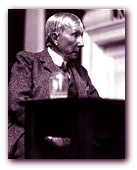Ax 17, versus 1-21

Recently a fellow blogger put forth this proposition, quoting yet another blogger:
"it is important for all parties to realize it is not a blind faith." He cites Acts 17, where Paul uses reasoning and logic to convince people of Christ's authenticity.”
Let’s go to the text. From the King James revision:
“Now when they had passed through Amphipolis and Apollonia, they came to Thessalonica, where was a synagogue of the Jews:
And Paul, as his manner was, went in unto them, and three sabbath days reasoned with them out of the scriptures,
Opening and alleging, that Christ must needs have suffered, and risen again from the dead; and that this Jesus, whom I preach unto you, is Christ.
And some of them believed, and consorted with Paul and Silas; and of the devout Greeks a great multitude, and of the chief women not a few.”
Stop!
He is reasoning with Jews, in the synagogue, so where does this multitude of devout Greeks and “chief women” come in? We are told elsewhere, that Paul “as was his manner” first preached to the Jews to “stop their mouths from speaking against him for preaching to the gentiles”. If this is true, then something is wrong with the chronology here, or else he is preaching to Jews and Pagans (let’s face it!) at the same time. The passage also leaves one with the impression that Paul went into the synagogue and “reasoned” with them, standing shoulder to shoulder with the Rabbi and Cantor in a kind of scriptural duel. Have you ever tried to interrupt a ceremony of any denomination? More likely, this took place after services, where the Jews, as was their custom, argued points of Talmudic law. This was done in a formalized way, asking questions, giving answers, and supporting those answers with scripture. This is the same activity that a young Jesus was alleged to have taken part in, and so impressed the Rabbis. Paul would have been arguing , I mean “reasoning”, with some of the fiercest defenders of the Jewish faith. Anyone want to bet that didn’t get heated? But in this passage, we are led to believe that everything was civil, and Paul was winning.
I have gone back to commentaries on these passages dating back to the 1600’s. I find it peculiar that I have found no conjecture on exactly what passages Paul cited in his arguments. Can anyone help me with a reference here? One must assume that he is quoting Ezekiel, but specifics would be expected here. This is the core of his mission at this time, and all that is recorded are the day-to-day events. The actual substance of his arguments appear to be glossed over. Maybe they weren’t all that compelling? We will never know, because all we get here is something that equates to, “... and then he said some authoritative stuff.”
“But the Jews which believed not, moved with envy, took unto them certain lewd fellows of the baser sort, and gathered a company, and set all the city on an uproar, and assaulted the house of Jason, and sought to bring them out to the people.”
Does this make sense? The Jews are a small enclave, living in a city in Greece, and practicing a religion that was not accepted by Rome. The attribution of “envy” (translated as jealousy in other versions) sounds like an ancient case of spin doctoring. It suggests that accusation of last resort that children hurl at each other, “You’re just jealous!” How likely is it, that members of a community would be envious of an itinerant preacher of a fledgling religion with fewer followers than it would take to make a decent neighborhood? Someone who often needs to steal away in the middle of the night, just ahead of an angry mob? Yeah, I’d be envious of that.
And then we come to the part where the Jews enlist the aid of “lewd fellows of a baser sort”. First, does this sound like the way a religious community would behave? One that probably kept apart from their pagan neighbors? One that probably feared persecution at the hands of their pagan neighbors, should anything happen to piss those neighbors off? Second, do lewd fellows of a baser sort generally need encouragement? There were plenty in my High School, and they were what you’d call “self starters”. This passage reads like one of those re-writes that were common in the city of Rome, when Judaism was an outlawed religion, and the Christians were busy trying to distance themselves from their own roots. Not that it worked (roar!). “Let’s not make too big a deal about the Greeks kicking us out of every major city. Blame the Jews, those ingrates!
“And when they found them not, they drew Jason and certain brethren unto the rulers of the city, crying, These that have turned the world upside down are come hither also; Whom Jason hath received: and these all do contrary to the decrees of Caesar, saying that there is another king, [one] Jesus. And they troubled the people and the rulers of the city, when they heard these things And when they had taken security of Jason, and of the other, they let them go.”
So... these lewd and base fellows drag Jason and friends out into the street, and turn them over to an angry mob that... takes them to the magistrate who fines them for disturbing the peace. Sounds like rabble to me. Meanwhile, Paul presumably decides that discretion is the better part of valor and practices not being found.
“And the brethren immediately sent away Paul and Silas by night unto Berea:“
Having posted bond, Jason no doubt wanted no further trouble with the authorities, and perhaps even wanted to see his “security” again. Paul was persuaded to make his not being found a little more permanent.
“who coming [thither] went into the synagogue of the Jews. These were more noble than those in Thessalonica, in that they received the word with all readiness of mind, and searched the scriptures daily, whether those things were so.”
Ah, at last, after being booted all over Greece, it looks like Paul has found a sympathetic community!
“Therefore many of them believed; also of honourable women which were Greeks, and of men, not a few. But when the Jews of Thessalonica had knowledge that the word of God was preached of Paul at Berea, they came thither also, and stirred up the people.”
Alas, it was not to be! Those damned Thessalonicans tracked him down! Somehow, they had it out for Paul. Or, maybe, a couple of folks came up the road, and related the story of the shit hitting the fan in Thessalonica. I’m guessing that the people of Berea did not need much stirring to decide that they did not want to risk the ire of their Roman overlords. Unlike today, everybody back then knew what happened when you pissed off the Romans. Look up the word “decimate” if you need a crash course.
“And then immediately the brethren sent away Paul to go as it were to the sea: but Silas and Timotheus abode there still.”
There he goes again, like a thief in the night. This time they put him on a boat. As Lenny Bruce would say some 1900 years later, “There’s a boat leaving Thursday...”
"And they that conducted Paul brought him unto Athens: and receiving a commandment unto Silas and Timotheus for to come to him with all speed, they departed."
So, how do you explain this? Paul decided while at sea that he needed some side boys with him? Or, maybe, Silas and Timmy stayed behind as a diversion, so no one would know that Paul had already done a bunk. In any case, Paul is not even settled in when he sends a message back with the crew of the ship. Perhaps he realized that a leader needs followers and thought they would set a good example of what he was looking for in Athens.
“Now while Paul waited for them at Athens, his spirit was stirred in him, when he saw the city wholly given to idolatry.”
Ok, but next we are told:
“Therefore disputed he in the synagogue with the Jews, and with the devout persons, and in the market daily with them that met with him.”
Are we to believe that the Jews were given to idolatry? After the 10 Commandments and everything? Perhaps “wholly” was an exaggeration, in which case exaggeration is “the Truth” since every word of this scripture is allegedly true.... I also note that Paul has abandoned "reasoning" in favor of "disputing".
“Then certain philosophers of the Epicureans, and of the Stoicks, encountered him. And some said, What will this babbler say? other some, He seemeth to be a setter forth of strange gods: because he preached unto them Jesus, and the resurrection. And they took him, and brought him unto Areopagus, saying, May we know what this new doctrine, whereof thou speakest, [is]? For thou bringest certain strange things to our ears: we would know therefore what these things mean. (For all the Athenians and strangers which were there spent their time in nothing else, but either to tell, or to hear some new thing.)”
“(For all the Athenians and strangers which were there spent their time in nothing else, but either to tell, or to hear some new thing.)” That would be everyone, and nobody did anything but gossip, so they must have all starved. All true, right? At least some of the philosophers heard Paul out. He would revile them later in one of his letters, so I guess he didn’t make that many converts.
Next time, what Paul told the Athenians






